PREVIOUS
Non-Aligned Movement and 19th NAM summit
April 23 , 2024
364 days
2855
0
(இதன் தமிழ் வடிவத்திற்கு இங்கே சொடுக்கவும்)
Introduction:
- The Non-Aligned Movement (NAM) was founded in 1961 with the view to advancing interests of developing countries in the context of Cold War confrontation.
- The Movement played a crucial role in decolonization, formation of new independent states, and democratization of international relations.
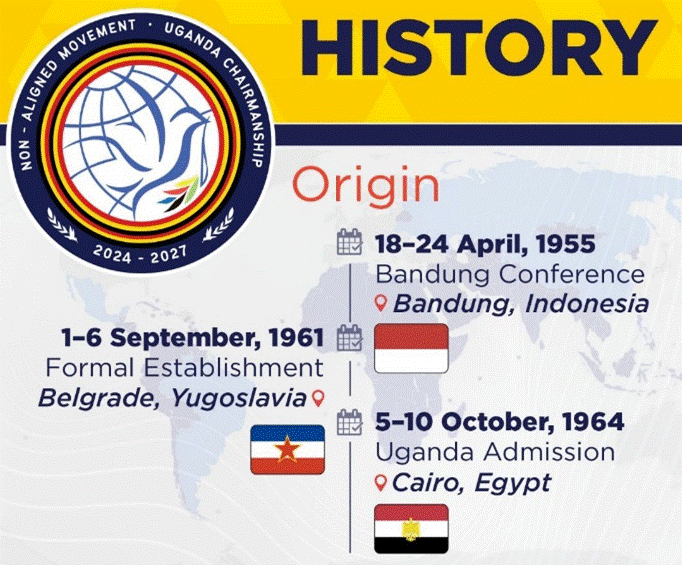
Membership and Structure:
- At present, the NAM consists of 120 States that account for about 60% of the United Nations overall membership.
- Observer status in the NAM has been provided to 17 states and 10 organizations.
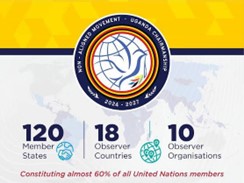
Principles and Ideals:
- The Non-Aligned Movement aspires to occupy a niche of a political gathering that seeks to oppose West’s unilateral approaches and actions on the global stage.
- NAM builds its work on ten Bandung principles, including:
- Respect for fundamental human rights and for the purposes and the principles of the Charter of the United Nations.
- Respect for the sovereignty and territorial integrity of all nations.
- Recognition of the equality of all races and of the equality of all nations large and small.
- Abstention from intervention or interference in the internal affairs of another country.
- Respect for the right of each nation to defend itself singly or collectively, in conformity with the Charter of the United Nations.
- Abstention from the use of arrangements of collective defense to serve the particular interests of any of the big powers, abstention by any country from exerting pressures on other countries.
- Refraining from acts or threats of aggression or the use of force against the territorial integrity or political independence of any country.
- Settlement of all international disputes by peaceful means, such as negotiation, conciliation, arbitration or judicial settlement as well as other peaceful means of the parties’ own choice, in conformity with the Charter of the United Nations.
- Promotion of mutual interests and cooperation.
- Respect for justice and international obligation.
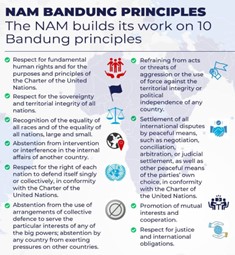
Goals and Achievements of the NAM
Ending Colonialism and Supporting Liberation Movements
- NAM aimed to end colonialism, supporting national liberation movements by granting them full membership status in its conferences.
- This support accelerated decolonization in Asia and Africa, contributing to independence and majority rule in countries like South Africa and Namibia.
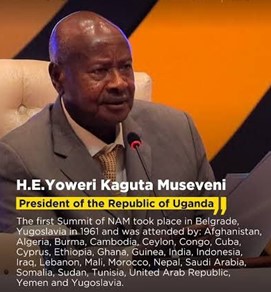
Advocating for Peace, Disarmament, and Altering Global Dynamics
- NAM played a crucial role in promoting peace, peaceful co-existence, and human brotherhood, reducing Cold War tensions.
- It advocated for disarmament and an end to the arms race, emphasizing the need for general and complete disarmament under international control.
- NAM's efforts led to calls for a permanent moratorium on nuclear testing and the banning of chemical weapons.
- Additionally, NAM altered the composition of the UN.
- It created a new voting majority in the General Assembly and providing a common platform for the Third World to advocate its causes, democratizing international relations.

Pursuing Economic Equality and Empowerment
- NAM called for a New International Economic Order (NIEO) to address economic inequality and neocolonialism.
- It advocated for restructuring the international economic and monetary systems based on equality, non-discrimination, and cooperation.
- NAM's advocacy led to the recognition of economic sovereignty over natural resources and legitimization of interventionist trade policies.
- It also highlighted issues concerning multinational corporations and technology transfer, leading to initiatives like compensatory finance systems by the IMF.
- In the cultural sphere, NAM's establishment of the Pool of News Agencies enabled politically and economically weaker nations to communicate independently, challenging Western dominance in communication systems.
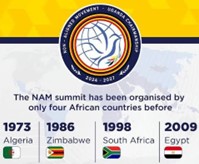
19th NAM summit
- The 19th Summit of Heads of State and Government of the Non-Aligned Movement convened in Kampala, Republic of Uganda, on January 19th to 20th, 2024.
- Theme for this summit was "Deepening Cooperation for Shared Global Affluence".

Outcomes of the 19th Summit of the Non-Aligned Movement
Review and Continuation
- Leaders at the summit conducted a comprehensive review of the progress made since the previous summit in 2019 held at Azerbaijan.
- They had acknowledged the achievements and identified areas requiring further attention, demonstrating a commitment to continuity and follow-up on previous commitments.

Guiding Principles and Historical Context
- Emphasizing the historical context of the Non-Aligned Movement, leaders reiterated the movement's founding principles articulated in Bandung (1955) and Belgrade (1961).
- These principles include respect for sovereignty, territorial integrity, non-interference in internal affairs, and peaceful coexistence, reflecting the movement's origins during the Cold War era.
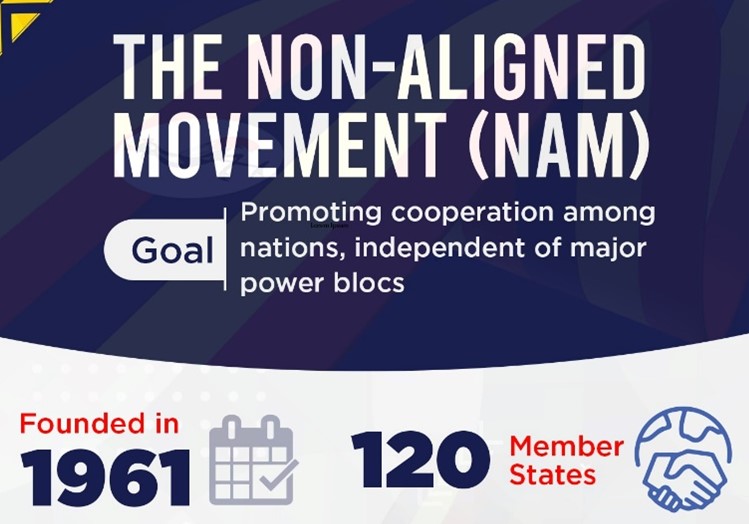
Addressing Global Challenges
- The summit has provided a platform for member states to address a wide range of global challenges, including armed conflicts, humanitarian crises, terrorism, and extremism.
- Leaders had underscored the importance of collective action and international cooperation in addressing these challenges, emphasizing the need for peaceful dispute resolution and conflict prevention.
Solidarity with Palestine
- The summit reaffirmed the Non-Aligned Movement's longstanding support for the Palestinian cause, condemning Israeli military aggression, settlement expansion, and violations of Palestinian rights.
- The Leaders called for an immediate and durable ceasefire in Gaza, the end of the Israeli occupation, and the realization of Palestinian statehood with East Jerusalem as its capital.
Promoting Sustainable Development
- Recognizing the importance of sustainable development, leaders committed to advancing the implementation of the 2030 Agenda and the Addis Ababa Action Agenda.
- They have emphasized the need for international cooperation, financial support, technology transfer, and capacity-building to support developing countries in achieving their sustainable development goals.
Climate Change and Environmental Protection
- The summit had highlighted the urgency of addressing climate change and environmental degradation.
- Leaders had called for enhanced efforts to mitigate greenhouse gas emissions, adapt to the impacts of climate change, and support vulnerable communities.
- They stressed the importance of equitable and sustainable development pathways and international solidarity in addressing climate-related challenges.
Human Rights and Gender Equality
- Leaders reaffirmed their commitment to promoting and protecting human rights, including gender equality and empowerment.
- They condemned all forms of discrimination, violence, and extremism, emphasizing the importance of tolerance, dialogue, and respect for diversity.
Peace and Security
- The summit emphasized the central role of the United Nations in maintaining international peace and security.
- Leaders called for the revitalization of the UN General Assembly and the reform of the UN Security Council to better reflect the interests and priorities of all member states.
- They also reiterated support for UN peacekeeping operations and conflict prevention efforts.
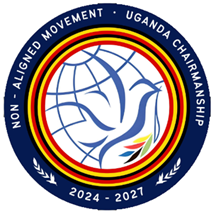
Regional and International Cooperation
- Recognizing the importance of regional and international cooperation, leaders emphasized the need to strengthen partnerships and dialogue mechanisms.
- They called for enhanced cooperation between the Non-Aligned Movement and other regional organizations, such as the African Union, to address common challenges and promote peace, stability, and development.
Commitment to Action
- The summit concluded with a commitment to translating discussions and agreements into concrete action.
- Leaders pledged to work closely together to implement the outcomes of the summit and advance the collective interests of the Non-Aligned Movement.
- Overall, the 19th Summit of the Non-Aligned Movement reaffirmed the movement's relevance and commitment to promoting peace, development, and cooperation on the global stage.
- Leaders demonstrated a strong resolve to address pressing global challenges and advance the shared interests of member states through collective action and solidarity.
-------------------------------------
Leave a Reply
Your Comment is awaiting moderation.


